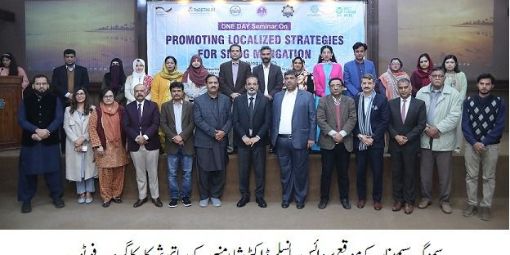
The Rural Community Development Society (RCDS), in collaboration with Welthungerhilfe, organized a seminar at the University of Engineering and Technology (UET) Lahore to promote local strategies for smog mitigation. The seminar was attended by UET Vice Chancellor Professor Dr. Shahid Munir, along with over 500 participants, including students, faculty members, representatives of civil society, members of the Punjab Assembly, journalists, and government officials.
The objective of the seminar was to raise awareness among students about the causes and effects of smog, as well as its negative impact on human health, the environment, and quality of life, so that they could contribute to smog mitigation efforts. Experts from academia, research institutions, the Urban Unit, the Department of Environment and Climate Change, PDMA, and the City Traffic Police discussed solutions and strategies to combat smog. RCDS Managing Director Mr. Qaiser Iqbal stated that smog is rapidly increasing in Punjab due to environmental pollution and deforestation.
Poor management of transportation and waste disposal is contributing to rising carbon dioxide emissions, which are a major factor in climate change. Speakers also highlighted the cultural impacts of climate change, noting that Pakistan is experiencing natural disasters such as heatwaves, floods, and droughts. They emphasized that smog is severely affecting daily life and that climate change poses a significant threat to Pakistan’s traditions and historical heritage, including sites like Mohenjo-Daro and Harappa. Dr. Imran Sattar from the Health Department explained that smog is severely impacting human health and agriculture.
He outlined preventive measures to avoid smog-related health risks and advised limiting outdoor activities during smoggy conditions. Raheela Khadim Hussain, Parliamentary Secretary for Environment and Climate Change discussed the Punjab government’s efforts and policies aimed at smog control and environmental protection.
UET Vice Chancellor Professor Dr. Shahid Munir emphasized that keeping the country clean is a shared responsibility, and through collective efforts, a smog-free nation can be achieved. He stated that transportation and industries are the primary causes of smog and presented viable strategies for its mitigation.